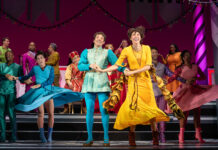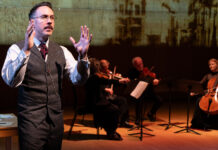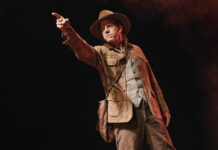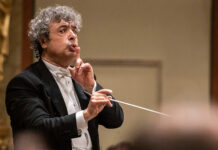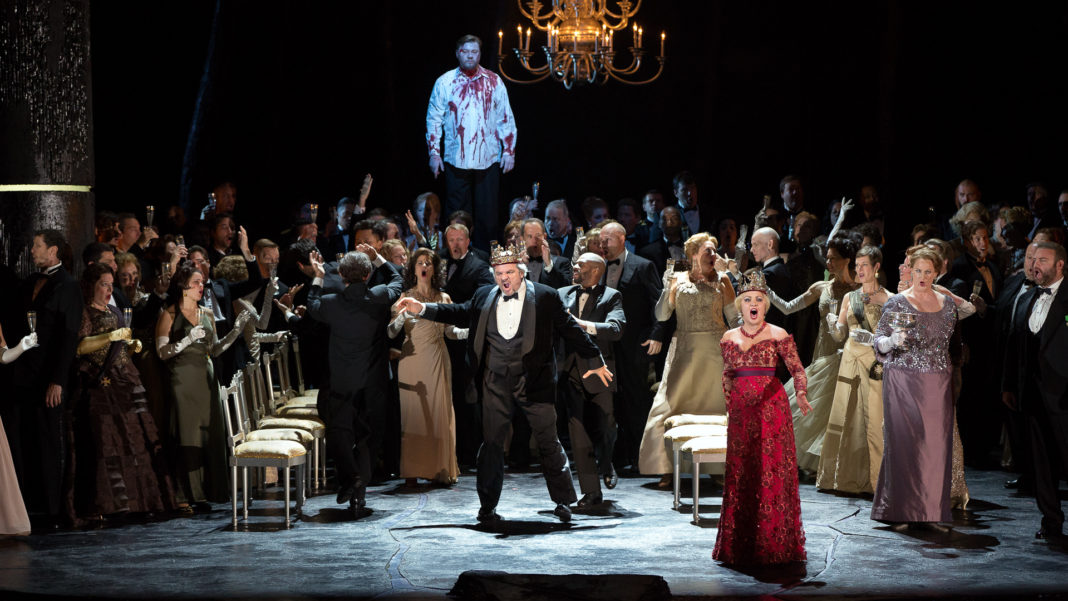MGM studios once declared they had “more stars than there are in heaven.” For Week 38 at the Met, the stars are aplenty. Which is a good thing for a week entitled Stars in Signature Roles.
This week you can see and hear Roberto Alagna, Kathleen Battle, Renée Fleming, Elīna Garanča, Dmitri Hvorostovsky, Jonas Kaufmann, Anna Netrebko, Jessye Norman, René Pape, Luciano Pavarotti and Leontyne Price.
Each production becomes available at 7:30 PM EDT/4:30 PM PDT on the Metropolitan Opera website. Every opera remains available for 23 hours. They are heavily promoting their Met Stars Live in Concert series and recently announced the cancellation of the full 2020-2021 season, so you’ll have to go past those announcements and promos to find the streaming productions. Schedules and timings may be subject to change.
If you read this column early enough on November 30th, you might still have time to catch the 1994-1995 season production of Simon Boccanegra by Giuseppe Verdi that concludes last week’s Family Drama series. It’s a good lead-in to this week as it features Plácido Domingo and Kiri Te Kanawa.
Here is the full line-up for Week 38 at the Met:
Monday, November 30 – Tchaikovsky’s Eugene Onegin
Conducted by Valery Gergiev; starring Renée Fleming, Ramón Vargas and Dmitri Hvorostovsky. This revival of Robert Carsen’s 1997 production is from the 2006-2007 season.This is an encore presentation of the production that was previously made available on March 22nd.
Pyotr Ilyich Tchaikovsky was inspired by Alexander Pushkin’s verse novel of the same name for this opera that had its world premiere in Moscow in 1879. The composer co-wrote the libretto (using much of Pushkin’s text as written) with Konstantin Shilovsky.
Onegin is a rather selfish man. Tatyana expresses her love for him, but he rejects her saying he isn’t suited to marriage. By the time he comes to regret the way he treated her, he has also come to regret the actions that lead to a duel that killed his best friend.
Anthony Tommasini, in his New York Times review raved, “You will seldom see better acting in opera then the scenes between Ms. Fleming and Mr. Hvorostovsky. With his white mane, commanding physique and earthy voice, Mr. Hvorostovsky projects charisma naturally, making him perfect for this diffident character.
“Everything and everyone seems to come to Onegin, which accounts for his passivity. In the scene in which he gently chastises Tatiana for having sent him a rash love letter, his paternalistic arrogance, as projected by Mr. Hvorostovsky, would have been infuriating had it not seemed so tragically clueless.”
Tuesday, December 1 – Verdi’s Aida
Conducted by James Levine; starring Leontyne Price, Fiorenza Cossotto, James McCracken and Simon Estes. This revival of John Dexter’s 1975 production is from the 1984-1985 season. This is an encore presentation of the production that was previously made available on May 1st.
Giuseppe Verdi’s Aida had its world premiere in Cairo in 1871. The libretto is by Antonio Ghislanzoni.
Aida is in love with General Radames and he feels just as passionately about the Ethiopian princess being held captive in Egypt. Radames chooses to wage war against Ethiopia and Aida must reconcile her love for her native land and the General about to wage war against her people.
This video clip does not represent the quality of the film the Met will be streaming. But it does reflect both the power of Leontyne Price and the immense popularity of this particular performance.
This film marked Price’s farewell to opera. From a purely historical perspective, that alone makes this opportunity to see it unmissable. Reviews were mixed on the production, but by the end the ovation Price received acknowledges more than just a production or a performance, but also her career.
As Donal Henahan said in his New York Times review, “The 57-year-old soprano took an act or two to warm to her work, but what she delivered in the Nile Scene turned out to be well worth the wait. In her most taxing aria, ‘O patria mia,’ there were powerful reminders of the Price that we remember best and want to remember, a Price beyond pearls. It was, intermittently but often enough to make the evening a memorable event, the singing of an artist of distinctive vocal timbre and personality.”
Wednesday, December 2 – Wagner’s Parsifal
Conducted by Daniele Gatti; starring Katarina Dalayman, Jonas Kaufmann, Peter Mattei and René Pape. This François Girard production is from the 2012-2013 season. This is an encore presentation of the production that was previously made available on April 9th and October 11th.
Richard Wagner was inspired by Wolfram von Eschenbach’s poem about the knight Percival who was in search of the Holy Grail and served at King Arthur’s Round Table. Parsifal was the composer’s last completed opera. It had its world premiere in Bayreuth in 1882. Wagner wrote both the music and the libretto.
Young Parsifal is woefully unaware of right or wrong. He has no concept of sin nor redemption. Raised by his mother, he’s unfamiliar with the ways of the world. He meets one of the Knights of the Grail and is given the opportunity to see the Holy Grail. While at the Castle, he hears King Amfortas, crying in pain. Though Amfortas was given a life of immortality by the Grail, his pain comes from a wound inflicted by Klingsor who took the Holy Spear from the King. Parsifal makes it his mission to return the Spear and destroy Klingsor and his kingdom in order so that the King’s suffering can end.
Anthony Tommasini, in his New York Times review, praised Kaufmann’s performance as the title character. “At 43 Mr. Kaufmann is in his glory, equally adept in German, Italian and French repertory. Handsome and limber, he is a natural onstage. The baritonal colorings of his sound, his clarion top notes, the blend of virility and tenderness in his singing, his refined musicianship — all these strengths come together in his distinctive Parsifal.”
Thursday, December 3 – Verdi’s Macbeth
Conducted by Fabio Luisi; starring Anna Netrebko, Joseph Calleja, Željko Lučić and René Pape. This revival of Adrian Noble’s 2007 production is from the 2014-2015 season. This is an encore presentation of the production that was previously made available on April 4th.
William Shakespeare’s Macbeth was the first of his plays to inspire an opera by Giuseppe Verdi. The libretto was written by Francesco Maria Piave with additional work by Andrea Maffei. The opera had its world premiere in Florence, Italy in 1847. Verdi re-wroked Macbeth and changed the language from Italian to French. The revised version had its premiere in Paris in 1865.
This is not Shakespeare set to music. Verdi did take much of what Shakespeare wrote about a Scottish general who is told by three witches that he will be the King of Scotland. With the help of his wife, Lady Macbeth, he stops at nothing to do so. However, Verdi couldn’t include the whole play in his opera, nor did he want to. The relationship between Macbeth and Lady MacBeth truly anchors this opera.
This production marked the first time Netrebko had sung the role of Lady Macbeth at the Met. Anthony Tommasini, writing in the New York Times, set up the challenges she was facing. “…the lead soprano role in Verdi’s Macbeth is not just a daunting challenge. For Ms. Netrebko, who turned 43 last week, it represents a shift from the lyric soprano and bel canto roles with which she made her reputation to vocally weightier repertory. Lady Macbeth is particularly risky and demanding.”
He was more than pleased with the result. “The years that Ms. Netrebko spent singing bel canto heroines paid off here in the skillful way she dispatched the trills and runs that Verdi folds into the vocal lines. One such place is the Act II banquet scene after Macbeth, having murdered King Duncan, has been proclaimed the new monarch. Lady Macbeth sings a drinking song, a brindisi, inviting the guests to join in a toast. Yet there was something eerily malevolent in the way this Lady Macbeth tossed off the song with insistent good cheer. Wearing a ruby red evening gown, her eyes wild, Ms. Netrebko almost willed her guests into having a good time, or else.”
Friday, December 4 – Bizet’s Carmen
Conducted by Yannick Nézet-Séguin; starring Barbara Frittoli, Elīna Garanča, Roberto Alagna and Teddy Tahu Rhodes. This Richard Eyre production is from the 2009-2010 season.
Georges Bizet collaborated with librettists Henri Meilhac and Ludovic Halévy on this immensely popular opera. It was based on Propser Mérimée’s novella of the same name.
When Carmen was first performed in Paris in 1875 it was considered both shocking and scandalous.
Set in Seville, Spain, Carmen is a gypsy who has caught everyone’s eye. A soldier, Don José, plays coy and gives her no attention. Her flirtation causes troubles for both when Don José’s girlfriend, Micaëla arrives. Tensions escalate between the two women and after a knight fight, José must arrest Carmen. When she seduces him it sets off a series of events that will not end well for the gypsy woman.
Anthony Tommasini, in his New York Times review raved about this new production. “In the naturalness of the performances, from that of the Latvian mezzo-soprano Elīna Garanča in the title role to those of the children in the chorus who scamper into the town square to watch the changing of the guard, it is clear that Mr. Eyre has lavished attention on everyone. The singers benefited immensely from the work of the rising 34-year-old Canadian conductor Yannick Nézet-Séguin, in his Met debut, who led a bracing, fleet and fresh account of the score, although he started the rousing prelude at a breakneck, frenetic tempo.”
Saturday, December 5 – Strauss’s Ariadne auf Naxos
Conducted by James Levine; starring Jessye Norman, Kathleen Battle and Tatiana Troyanos. This revival of Carl Ebert’s 1962 production is from the 1987-1988 season. This is an encore presentation of the production that was previously made available on May 13th.
Richard Strauss’ Ariadne auf Naxos had its world premiere in Stuttgart in 1912. The libretto is by Hugo von Hofmannsthal.
This is really an opera-within-an-opera. Two different sets of performers have been brought together at the home of a rich man. One group is a serious ensemble of opera singers who embrace the highest of dramatic operas. The other is a group of comedians who are set on acting out an Italian comedy. Their host, seeing that time is quickly running out, asks them to perform their separate works together.
Many critics believe the opening 40-minute prologue is vastly superior to the rest of the work.
Obviously having Norman and Battle in an opera together is reason enough to watch Ariadne auf Naxos. But here’s some trivia you might not know: Barbara Bonney (in her Metropolitan Opera debut) and Dawn Upshaw play nymphs in this production.
Sunday, December 6 – Puccini’s Tosca
Conducted by James Conlon; starring Shirley Verrett, Luciano Pavarotti and Cornell MacNeil. This Tito Gobbi production is from the 1978-1979 season. This is an encore presentation of the production that was previously made available on June 4th.
It is quite likely that Puccini’s Tosca was the first opera to premiere in 1900. Its first performance was on January 14 in Rome. Based on Victorien Sardou’s 1887 play of the same name, Tosca‘s libretto was written by Luigi Illica and Giuseppe Giacosa.
The setting for Tosca is Rome in 1800. The Napoleonic wars were raging and political unrest was omnipresent. The opera takes place over the course of slightly less than 24 hours. Floria Tosca is the object of Chief of Police Baron Scarpia’s lust. He uses suspicions that her lover, Mario Cavaradossi, aided a political prisoner who has escaped as an opportunity to get him out of his way which will leave Tosca for himself. After capturing Cavaradossi, Scarpia says that if Tosca doesn’t become his lover, he will have Cavaradossi killed.
When Pavarotti took on this role it was one of his first forays into more demanding roles that were tougher on his vocal chords.
Donal Henahan, had this to say about Pavarotti in his New York Times review, “Mr. Pavarotti, though a bit thin of voice in such outpourings as ‘Recondite armonia,’ pitched himself into the action, vocally and theatrically, with his usual infectious enthusiasm. Puccini is notoriously hard on voices—perhaps more so than Verdi or even Wagner— and Mr. Pavarotti is taking a calculated risk in moving into emotionally heavy and tone‐shredding roles. But his ‘Vittoria!’ rang out excitingly, without sounding strident, and in the lyrical passages he was nothing less than glorious. Bravissimo is not good enough for such singing. How about pavarotissimo?”
Which star and opera most appeals to you about Week 38 at the Met? Whichever opera or stars you choose, enjoy yourself!
Photo: Anna Netrebko, René Pape and Željko Lučić in Macbeth (Photo by Marty Sohl/Courtesy Metropolitan Opera)


